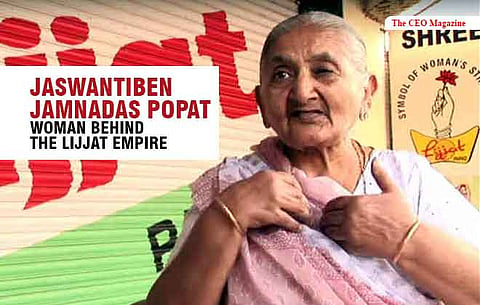

Jaswantiben Jamnadas Popat
Woman Behind The Lijjat Empire
How seven half-literate woman got along to start a business in 1959's Bombay, India with Rs. 80 ($1.50 in today's money) which reportedly had an annual turnover of $109 million as of 2018 with 43000 employees?
In an ideal world where woman and men are entitled to equality, a woman's rise to a leadership position remains is an eyebrow-raiser. But be it in developed countries or rural Indian areas, entrepreneurs, by nature are visionaries born to break the social norms, and they rise to become not only entrepreneurs but billionaires.
One such story of India's civilian award Padmashri recipient Jaswantiben Jamnadas Popat and her 62-year-old brand Lijjat Papad is extraordinarily incredible. Not sharing Jaswantiben's story in Indian entrepreneurship and woman empowerment of Indian history makes it as incomplete as an Indian thali without papad or poppadums.
The story to leading a successful business and a household name Lijjat Papad has its foundation in pure passion for working and sisterhood. It was not a journey Jaswantiben started alone and it is indeed not the one she covered alone as today the seven-woman established start-up is a hub for woman empowerment in India by making many women across the country independent.
Although she is the living example of age is just a number as her activeness will bring a young adult to shame easily. Jaswantiben is 91 years old, 62 years of which she dedicated to the business she started with her member sisters.
It was a move of seven women to supplement the family income back in 1959 while being semi-literate and unable to find jobs but something they didn't know would turn out to be a game-changer for the entire country.
It was on 15 March 1959 when seven-sisters including Jaswantiben Jamnadas Popat, Parvatiben Ramdas Thodani, Ujamben Narandas Kundalia, Banuben. N. Tanna, Laguben Amritlal Gokani, Jayaben V. Vithalani, and Chutadben Amish Gawadem gathered on the terrace of an old building in a crowded South Mumbai locality and rolled out four packets of papads to sell.
Seven women backed this business was started with merely Rs.80 (approximately $1.50 of today) which was borrowed by Chaganlal Karamsi Parekh, a social worker with a knack for entrepreneurship.
Even though they never imagined Lijjat turning out to be what it became for being a desperate effort to earn money for the family, they never gave up in the face of struggles that awaited them in this long decade of the journey.
It did not take a long period before the business idea exploded in the overcrowded and poverty affected towns of Mumbai. In three months, the members grew from seven to 25 woman as the quality and taste of the poppadoms acted in favour. But, it was also the year of discovering that women lacked rain prevented the drying of papads on the rooftop, the traditional way. Next year, they had cots and a stove ready.
Chhanganlal Parekh or Changanbapa guided women to not make two different qualities of papads and compromise on quality along with ensuring that they run it as a business and maintaining proper accounts.
The first attempt of expansion failed before its Lijjat Papad's incredible expansion began and it expanded as a co-operative with branches in Mumbai and rest of the country in subsequent years. Women were appreciated with awards and foreign dignitaries visited the factories. Exports flourished. Shri Mahila Friha Udyog Lijjat Papad which can be translated into Shri Women Home Industry Tasty Poppardoms was formed was registered as a society under the Societies Registration Act 1860
Eventually after witnessing the tremendous success of their world-famous papads they tried their hands on khakhra (1974), masala (1976), Vadi, wheat atta, and bakery products (1979) and successfully set up flour mills (1975), printing division (1977) and polypropylene packing division (1978). However, they did continue to have some unsuccessful ventures such as cottage leather (1979), matches (1979), and agarbattis (incense sticks).
But throughout these struggles what made Lijjat papad grow was not only the idea that Jaswabntiben started the business with but also its sustainable model that provided large-scale employment to rural women, who are illiterate but skilled. Indeed, Padmashri holder Jaswantiben Jamnadas Popat deserves the appreciation by the government of India that she received on 26th January 2021, Indian Republic Day for the contribution she made with a business in her own right and continues to lead at 91.
We wish more power to her and the independent woman you created using your business as a platform.
Follow us on Google News
